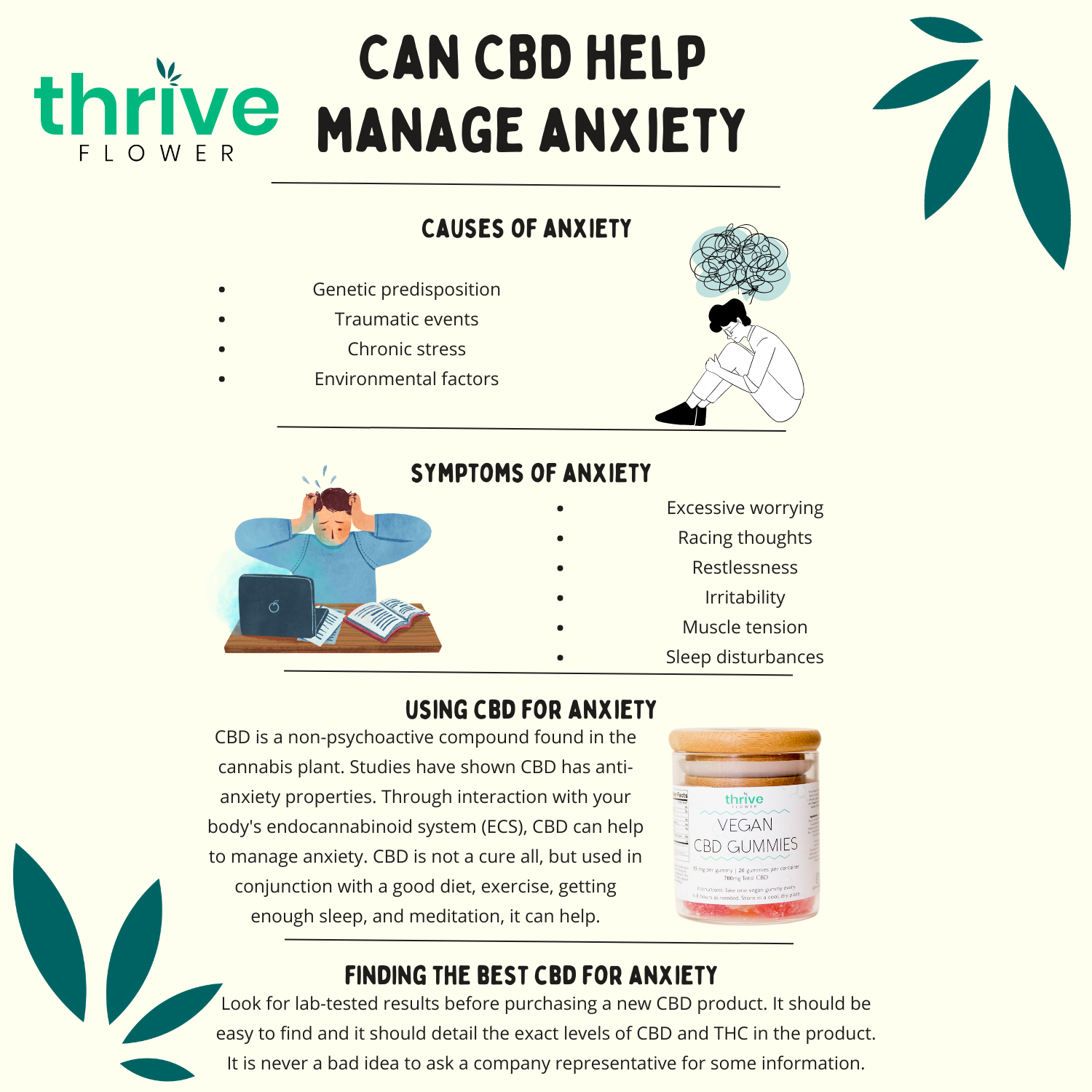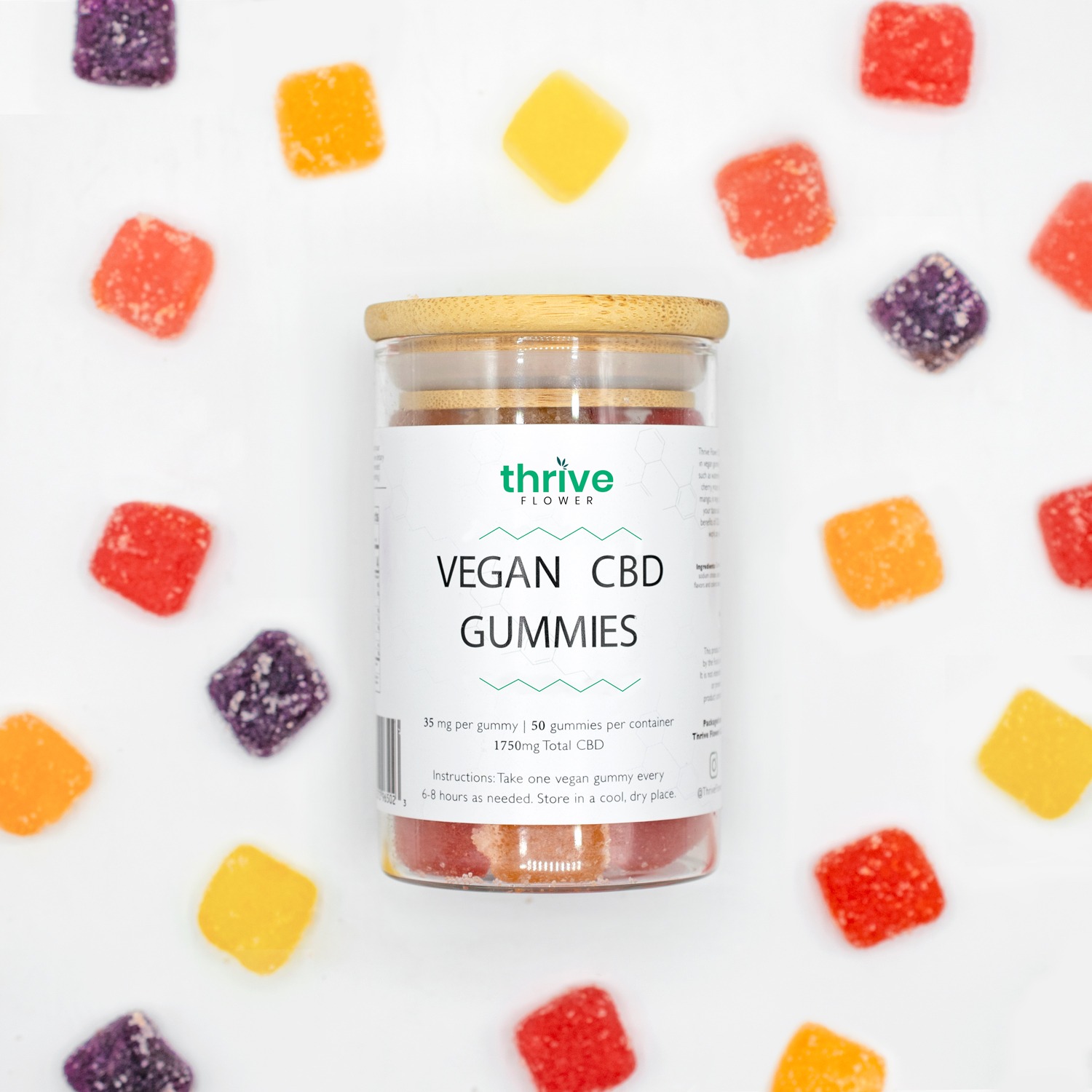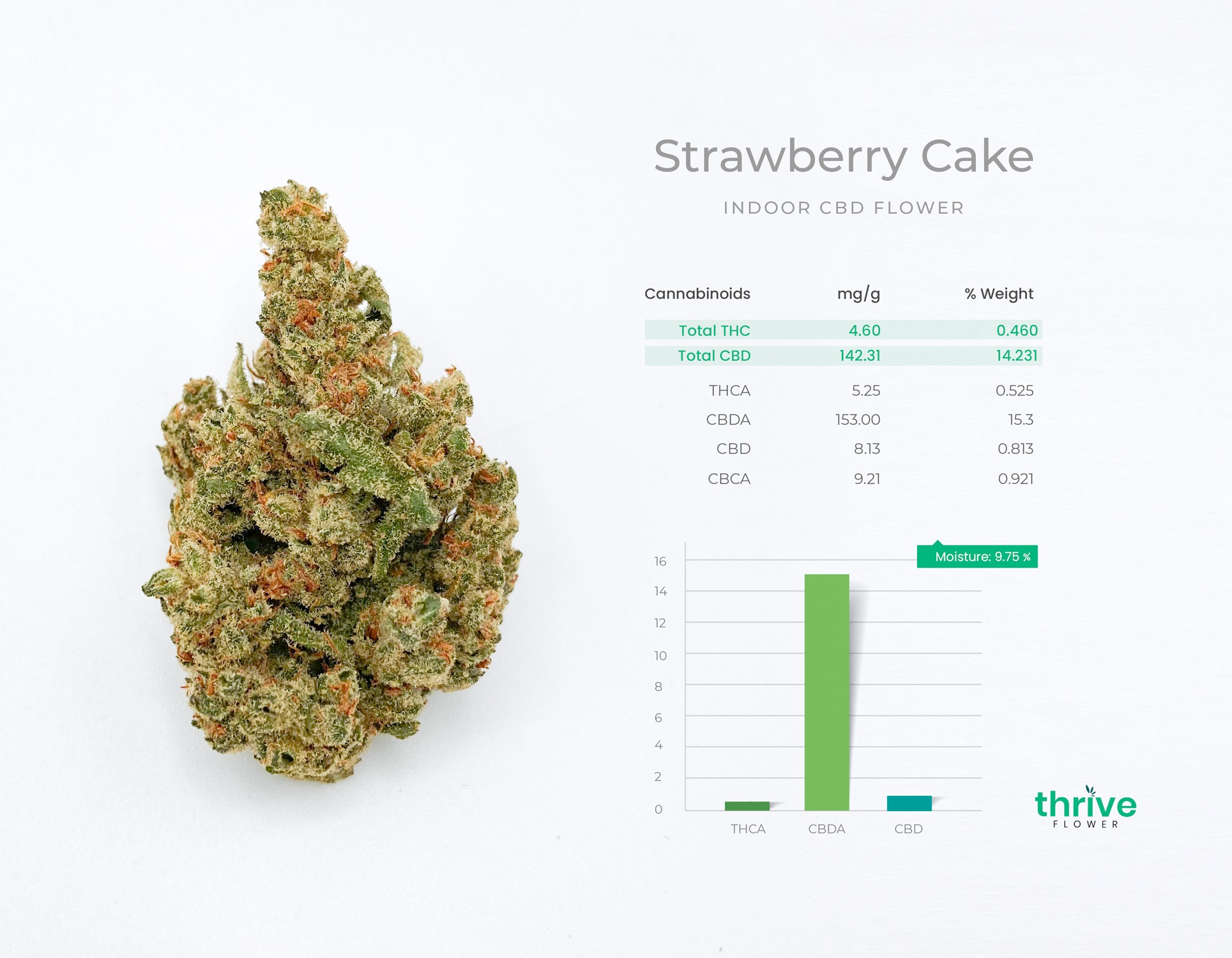Updated April 2023
Does CBD Help with Anxiety?

Does CBD Help with Anxiety? by Thrive Flower
In recent years, many of us have taken more notice of our mental health. This focus on mental health is something relatively new and there is a lot of talk about how to manage feelings of anxiety. Much of this talk has been centralized on cannabidiol, better known by its acronym, CBD. CBD is just one of over 100 different cannabinoids that make up the cannabis plant. It is found in both varieties of cannabis, hemp and marijuana. Hemp contains naturally higher levels of CBD than marijuana and hemp is federally legal via the passing of the Farm Bill in 2018.
Another major cannabinoid is the intoxicating tetrahydrocannabinol, THC. The biggest difference between CBD and THC is that unlike THC, CBD does NOT produce any sort of psychoactive high. CBD has been shown to have many of the same health benefits THC has, just without the high. This is why we call CBD, “help without the high”.
Many of those searching for ways to manage their mental health have turned to CBD because of its potential benefits all without the need to feel the high associated with marijuana and THC use. This means that you could use CBD to lessen your anxiety during work hours or at home with the kids, all without being high. There are many factors that play a role in how someone’s anxiety is managed.
These factors include your level of physical activity, your diet, your sleep schedule, and more. CBD is by no means a cure-all or a miracle anxiety cure. But it is definitely a powerful tool that you can keep in your anxiety-management tool belt. In this article we are going to explore how does CBD help with anxiety and what causes anxiety, some of the common symptoms of anxiety, and what you can do to manage anxiety.
Does CBD Help with Anxiety: Causes and Symptoms
What is Anxiety?
Anxiety is a common mental health condition characterized by feelings of worry, fear, and nervousness. It is estimated that about 40 million people in the United States suffer from some form of anxiety disorder, making it the most prevalent mental health condition in the country.*
Anxiety can manifest in various ways, including panic attacks, social anxiety, phobias, and generalized anxiety disorder. Symptoms of anxiety can include excessive worrying, racing thoughts, restlessness, irritability, difficulty concentrating, muscle tension, and sleep disturbances.*
The causes of anxiety are complex and can vary from person to person. Some people may have a genetic predisposition to anxiety, while others may develop anxiety due to environmental factors, such as a traumatic event or chronic stress.*
How Does CBD Help With Anxiety?

Treatment for anxiety often involves a combination of psychotherapy and medication. Cognitive-behavioral therapy (CBT) is a popular form of psychotherapy used to treat anxiety. CBT focuses on identifying and changing negative thought patterns and behaviors that contribute to anxiety.*
Medications used to treat anxiety include benzodiazepines, which are fast-acting but can be addictive, and selective serotonin reuptake inhibitors (SSRIs), which are slower-acting but have a lower risk of addiction.*
In recent years, there has been growing interest in the use of cannabidiol (CBD) as a potential treatment for anxiety. CBD is a non-psychoactive compound found in the cannabis plant that has been shown to have anti-anxiety properties in animal studies.*
One of the ways that CBD may help reduce anxiety is by interacting with the endocannabinoid system (ECS) in the body. The ECS is a complex network of receptors and enzymes that help regulate various bodily functions, including mood, appetite, and sleep.*
CBD has been shown to interact with the ECS in a way that may help reduce anxiety. Specifically, CBD has been found to increase the levels of anandamide, a neurotransmitter that plays a role in regulating mood and anxiety.*
Another way that CBD may help reduce anxiety is by activating the 5-HT1A receptor, a serotonin receptor that is involved in the regulation of mood and anxiety.*
While more research is needed to fully understand the potential benefits of CBD for anxiety, preliminary studies suggest that it may be a promising treatment option. However, it is important to note that CBD is not a cure for anxiety and should be used in conjunction with other treatments, such as psychotherapy and medication, as prescribed by a healthcare provider. It is almost important to have a healthy diet, stay active with exercise, get enough sleep, and practice meditation.
What is the Best CBD for Anxiety?
To find high-quality CBD for anxiety, it is important to find a company you can trust. They should have up-to-date lab-tested results for all of their products. If you are still wondering how does CBD help with anxiety and have any questions, a company representative should be easy to contact and they should have an informed answer for you.
When you find a company you like, it is time to choose a product. Different products are applied to the body in different ways and this can change how CBD affects you. Topical CBD products, like CBD Pain Relief Salve, while fantastic for pain and inflammation management, may not be your best bet to help with anxiety. We suggest using either smokable products like Hemp Flower or Vapor Pens, edibles such as CBD Gummies, or CBD oil (also called CBD Drops or CBD tinctures).
Additionally, it is also important to consider the type of CBD used in the product. Full-spectrum CBD products contain trace amounts of other cannabinoids such as CBG, CBN, and even THC. The goal of full-spectrum products is to produce the benefits of the entourage effect which states that using multiple cannabinoids together produces more benefits than just a single cannabinoid. That being said, many prefer to avoid THC all together and use products made with CBD isolate (99.9% pure CBD).
FDA Disclaimer: The statements made regarding these products have not been evaluated by the Food and Drug Administration. The efficacy of these products has not been confirmed by FDA-approved research. These products are not intended to diagnose, treat, cure or prevent any disease. All information presented here is not meant as a substitute for or alternative to information from healthcare practitioners. Please consult your healthcare professional about potential interactions or other possible complications before using any product.






